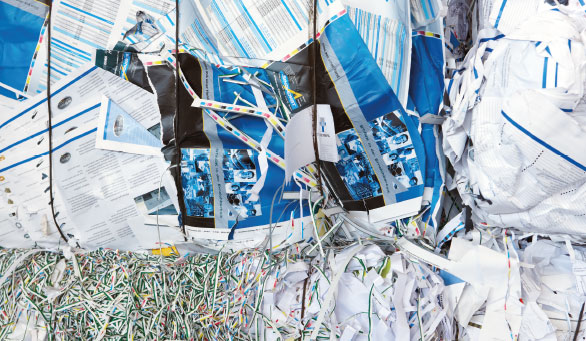An ever growing volume of cardboard
“Old paper is getting browner and browner” – what may sound like a riddle is in fact a description of a significant trend currently being experienced by those collecting old paper and cardboard. While glossy catalogues – such as the OTTO and the IKEA catalogues – are increasingly falling victim to digitisation, the boom in online sales is causing the volumes of old cardboard to rocket. As a result, businesses recycling old paper are facing a new challenge: this increased share of mixed packaging is changing the composition of the secondary raw materials. REMONDIS Trade and Sales GmbH, the Group’s specialist for old paper, believes that quality management is the solution to this problem and, as the first link in the supply chain, has set up its own quality team. The paper industry, which purchases the recycled raw materials, has welcomed this move. The result: the company’s role is changing from simply being a supplier to being a future-oriented partner for the industry.
Securing consistent quality levels
For the last two years, a newly set-up REMONDIS Trade and Sales unit has been taking a closer look at the paper being discarded in paper bins so that the company can provide its customers in the paper industry with a supply of secondary raw materials that are always of the same high quality. The team has, therefore, been systematically checking the composition of the paper collected from both households and key customers as well as the amount of outthrow, i.e. materials that do not belong in the bin. At the same time, plant operators and truck drivers are being given the training they need so that it is easier for them to identify and remove outthrow.

Current developments in both online retailing and the packaging industry are impacting on paper recycling businesses. Their response: to invest in even better quality management systems
“We ourselves can influence the quality of the collected materials. Each member of staff who is aware of this issue is an added bonus.”
Jannis Lammerskitten, a member of REMONDIS Trade and Sales’ quality assurance team
Deployment of measuring devices
The team, however, does not have to take the compacted bales of mixed materials apart to check the quality. A measuring device – the paper bale sensor – is able to do this work for them. Other methods are used to determine quality levels as well. Gravimetric measurements, for example, are taken to examine category 1.11 newsprint, as the recycled material delivered for this type of paper normally arrives as a bulk material.
If the findings of these measurements reveal that the amount of outthrow in the paper and cardboard is too high in a certain region, then the team contacts the local REMONDIS branch there to look for ways to collaborate with the respective local authorities to improve the quality of their paper collections. The most important factor here, however, is training REMONDIS’ own employees. Which is why Jannis Lammerskitten from REMONDIS Trade and Sales’ quality assurance team has been promoting their courses: “We ourselves can influence the quality of the collected materials. Each member of staff who is aware of this issue is an added bonus.”

Jannis Lammerskitten and Michael Cox both work in quality assurance at REMONDIS Trade and Sales GmbH. They keep a trained eye on events to ensure old paper can be transformed into a high quality recycled raw material
Best Practice
There is, however, potential to improve quality at the other end of the recycling chain as well. The customers from the paper industry have different requirements regarding the purity levels of the secondary raw materials. The quality management team is, therefore, collaborating with them to come up with a mutual solution regarding outthrow materials as well as to make the process more transparent. The team sees itself as being a facilitator of best practice solutions based on their wealth of industry experience.
This also applies to the new, innovative types of packaging such as functional barrier paper, water-resistant paper and thermopaper. Recyclers must first work out whether these materials can actually be recycled. At the end of the day, looking at the technical feasibility of recycling these types of paper, the question is: is this old paper or residual waste?
Successful recycling is being put at risk
If the changing composition of old paper becomes a permanent issue, then this development will not only create a challenge for the companies involved. It will also put the whole successful recycling process at risk. As the volumes of high quality paper collected decrease so, too, do the number of recycling options available to the companies. Michael Cox from REMONDIS Trade and Sales’ quality assurance team stressed: “Thanks to our in-depth know-how that we have gathered over the years, the paper industry sees us as being an equal partner – a partner, who can help them find suitable solutions. This means we can push forward ideas that will help ensure paper can continue to be effectively recycled.”
Image credits: image 1–4: © REMONDIS












